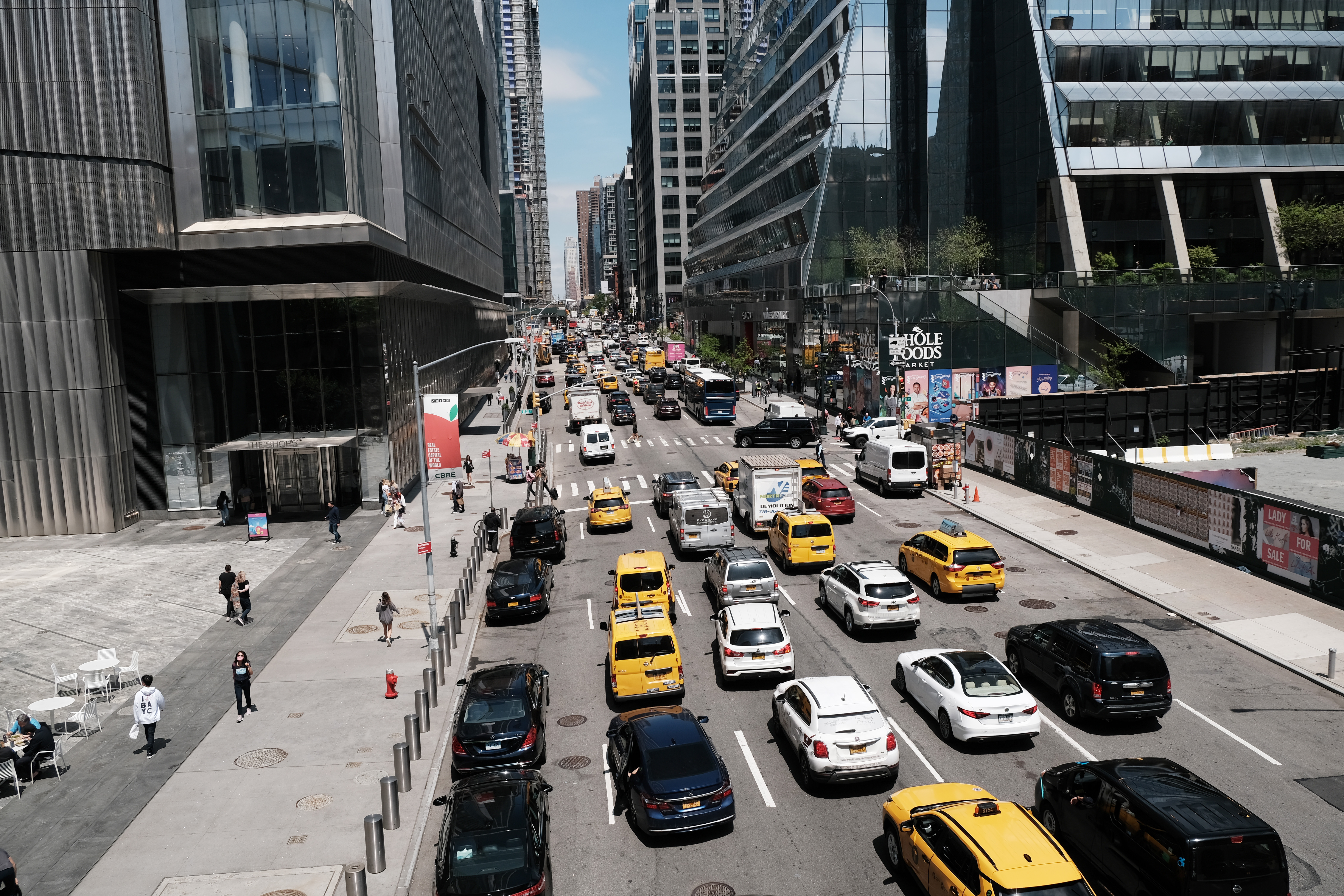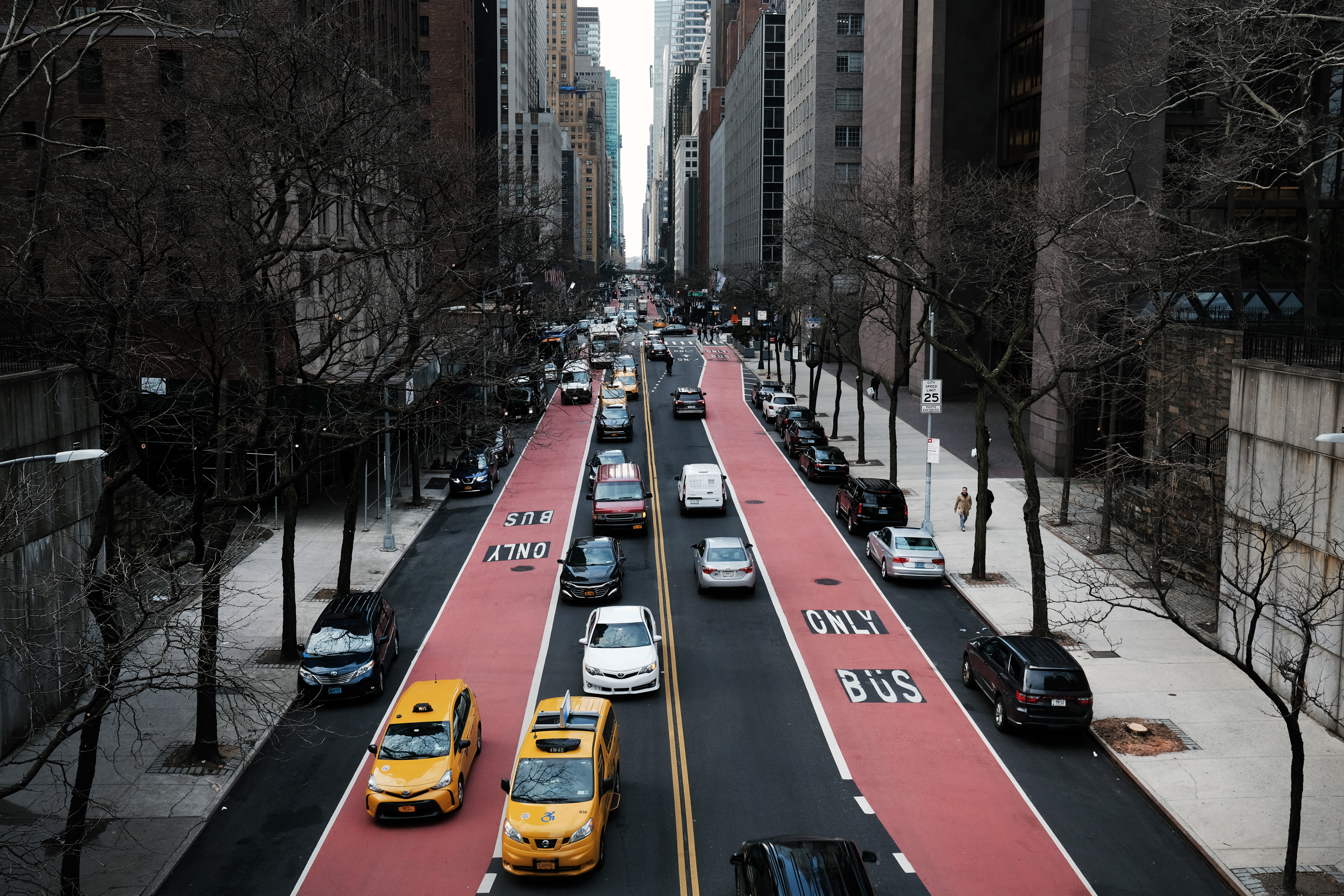Wish the city would do something to combat all the traffic that has returned to the city since the pandemic? That wish may be granted — and could come at a cost to drivers.
A long-delayed environmental assessment looking into the proposal for congestion pricing in Manhattan was finally released Wednesday morning, with the MTA saying the plan would have quite an impact on the city from economic, environmental and transit perspectives.
According to the plan, motorists entering Manhattan below 60th Street would be charged a toll electronically, with the exceptions being the West Side Highway and FDR Drive, which would not be part of the tolling plan. The revenue, estimated at $1 billion annually, would be used to back borrowing for capital improvements to the MTA’s subway and bus systems.
The MTA released seven different scenarios for the tolling plan, with peak-period toll rates to enter the "Central Business District" below 60th Street of anywhere from $9 to $23, depending on the version implemented. In virtually all configurations of the plan, "peak" would run from 6 a.m. to 8 p.m. on weekdays and 10 a.m. to 10 p.m. on weekends.
Get Tri-state area news and weather forecasts to your inbox. Sign up for NBC New York newsletters.
The environmental assessment tested seven different possible tolling scenarios, including different toll rates and a variety of exemptions. The assessment found that the program would either benefit (or at worst, not hurt) the majority of topics that were looked into, including regional air quality, regional transportation and parking.
According to the findings of the assessment, implementing tolls would achieve its main purpose of reducing traffic into the impacted area. It would also reduce congestion in the area, shorten trip times, increase economic productivity and keep energy consumption down, the MTA said.
However, the federal review found that traffic might get worse in other boroughs as a result of the plan — a fate that may be hard to imagine for those regularly stuck in traffic in the Bronx, Brooklyn or Queens. One infrastructure expert said that the number of trucks on the Cross Bronx Expressway would go up.
As for environmental impacts, the assessment found that pollution would drop about 11 percent in midtown and lower Manhattan, as well as nearly nine percent in Upper Manhattan. There would be benefits for other areas as well, but those showed to be much lower. For example, Hudson County in New Jersey would see pollution decrease just three percent.
Some areas would actually see a pollution increase, according to the assessment, but none were greater than two percent, with most less than a quarter of a percent jump.
There would also be notable increase in MTA bus reliability, and a moderate increase in transit ridership of about one or two percent, the study found.
MTA Chair and Janno Lieber touted the results of the assessment, saying it would provide "widespread benefits" for hte entire city.
"Bottom line: this is good for the environment, good for public transit and good for New York and the region. We look forward to receiving public feedback in the weeks ahead," Lieber said.
He wasn't alone in his praise, as NYC Department of Transportation Commissioner Ydanis Rodriguez said it was necessary to implement congestion pricing in order to "invest in public transit, curb emissions, and reduce traffic, which has roared back to pre-COVID levels."
MTA Communications Director Tim Minton said that the proposal is "a win for the entire region."
"The value of congestion pricing is clear: Less traffic, reduced pollution and more reliable mass transit for the vast majority of commuters, including those in New Jersey, who take trains and buses to Manhattan," Minton said.
The transit agency said that enacting the plan is the only way to generate the $15 billion needed for a century-old system that requires modern signals.
But not all have been on board. State Assemblyman Mike Lawler, from Rockland County, called it "a terrible idea, nothing more than a tax on suburban residents." And at least one MTA board member has previously stated that he plans on opposing the congestion pricing plan, saying the economy is too uncertain at this time.
"They gotta find a better way," said MTA Board Member David Mack.
The assessment found there could be adverse effects for some, such as low-income drivers who have no alternatives for commuting, or those who operate taxis and other for-hire vehicles. For those cases, the MTA could create a slew of mitigations or exemptions that would help offset the cost burdens those drivers would have to shoulder.
That's not enough for New York Rep. Lee Zeldin, the Republican candidate in the race for governor. He slammed the plan as a way for the MTA to address inefficient spending by taking more money from residents.
"Congestion pricing is a horrible idea that will create new economic pain for hard working New Yorkers. Life in New York is difficult enough for so many as is. Historic inflation, skyrocketing energy costs and more have left everyday New Yorkers pinching pennies," he said. "Now, politicians and bureaucrats want to jam up New Yorkers with a whole new scheme to rip more money out of New Yorkers’ wallets, grabbing another $1 billion out of the pockets of New Yorkers who can’t afford it."
Some lawmakers in New Jersey have said the plan is unfair because motorists already pay tolls at bridges and tunnels to enter New York, and the money from congestion pricing won't be used to improve public transit in New Jersey. Some motorists paying tolls to enter Manhattan from New Jersey are expected to receive discounts or be exempt.
"That's absurd, double taxation at its worst," said New Jersey Rep. Josh Gottheimer.
Gov. Kathy Hochul looked to ease critics of the plan, at least for now, saying that everything is still in a preliminary stage still.
"This process is not finished, there's still time for public input," said Hochul, aware that her Republican opponent and many suburban voters and elected officials do not like the plan as of now.
"We just have to make sure we have money for the MTA. If my political opponent would rather raise taxes on New Yorkers or shut down the subway — I’m not sure what his alternatives are," the governor said.
The tolls aren’t expected to be implemented until late 2023 at the earliest. New York’s state legislature approved a conceptual plan for congestion pricing in 2019 and it was initially projected to be in place in 2021. But the pandemic and a lack of guidance from federal regulators on the type of environmental review that was required combined to stall the project, until the guidance was ultimately provided in 2021.
It is not yet known how much the congestion pricing toll will be. Five people were named to the traffic mobility review board last month, which is tasked with deciding how much the toll will be — and how many New Yorkers are exempt.
The MTA will hold a series of hearings before the end of the month to collect feedback, which will also be accepted by comments online, by email, phone and fax starting Aug. 10. The series of six public hearings will be held in late August, on the following dates and times:
- Thursday, Aug. 25, 5 p.m. to 8 p.m.
- Saturday, Aug. 27, 10 a.m. to 1 p.m.
- Sunday, Aug. 28, 1 p.m. to 4 p.m.
- Monday, Aug. 29, 1 p.m. to 4 p.m.
- Tuesday, Aug. 30, 5 p.m. to 8 p.m.
- Wednesday, Aug. 31, 10 a.m. to 1 p.m.
There will also be an Environmental Justice Stakeholder Working Group on Aug. 19 at 1 p.m., as well as the Environmental Justice Technical Advisory Group meeting on Aug. 22 at 1 p.m.
After the meetings are held and all input from the public is gathered, the Federal Highway Administration must issue a final approval to the environmental plan before the project can go forward.



